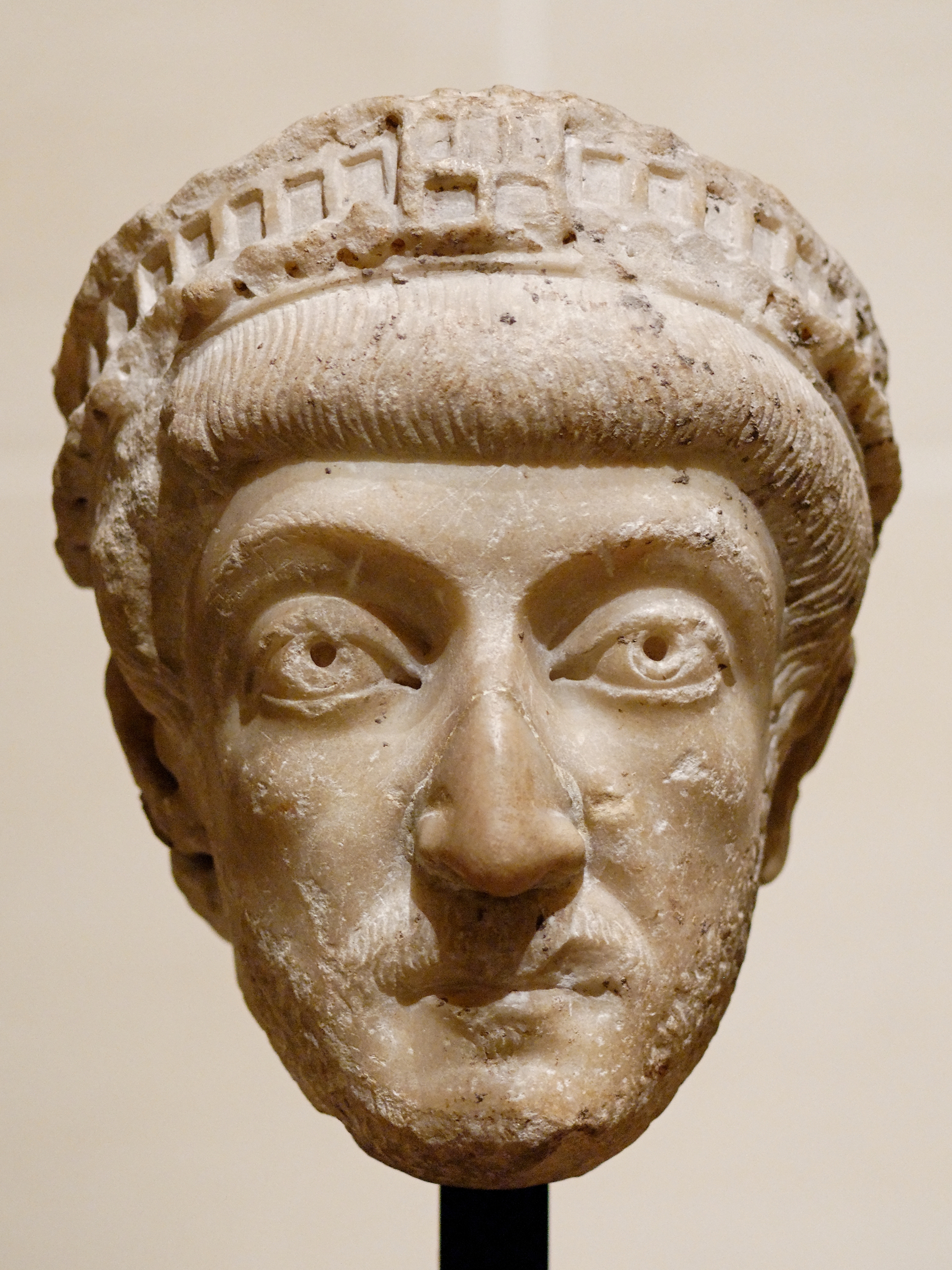|
Agentes In Rebus
The ''agentes in rebus'' ( grc, ἀγγελιαφόροι, angeliaphóroi, messengers, or , ''magistrianoí'', 'magister's men'.) were the late Roman imperial courier service and general agents of the central government from the 4th to the 7th centuries. History The exact date of their institution is unknown. They are first mentioned in 319, but may date to Diocletian's reforms in the late 3rd century, when they replaced the earlier and much-detested '' frumentarii''. The central imperial administration still needed couriers, and the ''agentes in rebus'' filled this role. Originally they acted as dispatch carriers, but eventually assumed a variety of duties—the title itself translates as "Those Active in Matters". They fell under the jurisdiction of the ''magister officiorum'' (Master of the Offices), hence their alternate Greek name of ''magistrianoi''. They were eventually abolished sometime in the early 8th century, as most of the ''magister''s functions were taken over by ... [...More Info...] [...Related Items...] OR: [Wikipedia] [Google] [Baidu] |
Magister Officiorum
The ''magister officiorum'' (Latin literally for "Master of Offices", in gr, μάγιστρος τῶν ὀφφικίων, magistros tōn offikiōn) was one of the most senior administrative officials in the Later Roman Empire and the early centuries of the Byzantine Empire. In Byzantium, the office was eventually transformed into a senior honorary rank, simply called ''magistros'' (μάγιστρος), until it disappeared in the 12th century. History and functions Late Roman Empire Although some scholars have supported its creation under Emperor Diocletian (), the office can first be definitely traced to the year 320, during the reign of Roman emperor Constantine the Great (), but was probably created sometime soon after 312–13, probably as part of an effort to limit the power of the praetorian prefect (''praefectus praetorio'') the Roman emperor's chief administrative official. The ''magister'' was first given command of the palace guard, the '' Scholae Palatinae''. He w ... [...More Info...] [...Related Items...] OR: [Wikipedia] [Google] [Baidu] |
Procopius
Procopius of Caesarea ( grc-gre, Προκόπιος ὁ Καισαρεύς ''Prokópios ho Kaisareús''; la, Procopius Caesariensis; – after 565) was a prominent late antique Greek scholar from Caesarea Maritima. Accompanying the Roman general Belisarius in Emperor Justinian's wars, Procopius became the principal Roman historian of the 6th century, writing the ''History of the Wars'', the ''Buildings'', and the ''Secret History''. Life Apart from his own writings the main source for Procopius's life was an entry in the ''Suda'',Suda pi.2479. See under 'Procopius' oSuda On Line a Byzantine Greek encyclopaedia written sometime after 975 which discusses his early life. He was a native of Caesarea in the province of '' Palaestina Prima''. He would have received a conventional upper class education in the Greek classics and rhetoric, perhaps at the famous school at Gaza. He may have attended law school, possibly at Berytus (present-day Beirut) or Constantinople (now Istanbu ... [...More Info...] [...Related Items...] OR: [Wikipedia] [Google] [Baidu] |
Gillian Bradshaw
Gillian Marucha Bradshaw (born May 14, 1956) is an American writer of historical fiction, historical fantasy, children's literature, science fiction, and contemporary science-based novels, who lives in Britain. Her serious historical novels are often set in classical antiquity — Ancient Egypt, Ancient Greece, the Byzantine Empire, Saka and the Greco-Bactrian Kingdom, Imperial Rome, Sub-Roman Britain and Roman Britain. She has also written two novels set in the English Civil War. Biography Gillian Bradshaw was born in Falls Church, Virginia, and spent part of her youth in Santiago, Chile. She attended the University of Michigan, where she won the Phillips Prize for Classical Greek in 1975 and 1977, as well as the Hopwood Prize for fiction for her first novel, ''Hawk of May''. She went on to advanced study at Newnham College, Cambridge, where she studied Classical philology. ''Hawk of May'' was published while she was preparing for University of Cambridge exams. Bradshaw deci ... [...More Info...] [...Related Items...] OR: [Wikipedia] [Google] [Baidu] |
Agent Of Byzantium
''Agent of Byzantium'' is a 1987 collection of short stories by Harry Turtledove, centered on the exploits of Basil Argyros, a Byzantine secret agent. The stories are set in an alternate 14th century, where Islam never existed and the great ancient empires of Byzantium (the Eastern Roman Empire) and Sassanid Persia survive. Setting In this universe, the point of divergence occurs when the Prophet Muhammad (Mouamet), instead of developing Islam, converted to Christianity and became a celebrated prelate and saint. Without the Muslim conquests, the Eastern Roman Empire remained the pre-eminent power in the Mediterranean world. The Emperor Constans II subdued the Lombards in Italy, and the Iberian peninsula ( Ispania) and the southern coast of Gaul were also recovered. Most of Gaul, Britain and Germania are in "barbarian" hands, and have broken away from Byzantine orthodoxy, following the doctrine of '' filioque'' and a separate line of Popes. In the East, the Byzantine ... [...More Info...] [...Related Items...] OR: [Wikipedia] [Google] [Baidu] |
Harry Turtledove
Harry Norman Turtledove (born June 14, 1949) is an American author who is best known for his work in the genres of alternate history, historical fiction, fantasy, science fiction, and mystery fiction. He is a student of history and completed his PhD in Byzantine history. His dissertation was on the period AD 565–582. He lives in Southern California. In addition to his birth name, Turtledove writes under a number of pen names: Eric Iverson, H. N. Turteltaub, Dan Chernenko, and Mark Gordian. He began publishing novels in the realm of fantasy starting in 1979 and continues to publish to the current day; his latest being ''Or Even Eagle Flew'' (2021) about Amelia Earhart and WWII. Early life Turtledove was born in Los Angeles, California, on June 14, 1949 and grew up in Gardena in Southern California. His paternal grandparents, who were Romanian Jews, had first emigrated to Winnipeg, Manitoba, before they moved to California in the United States. He was educated in loca ... [...More Info...] [...Related Items...] OR: [Wikipedia] [Google] [Baidu] |
Codex Theodosianus
The ''Codex Theodosianus'' (Eng. Theodosian Code) was a compilation of the laws of the Roman Empire under the Christian emperors since 312. A commission was established by Emperor Theodosius II and his co-emperor Valentinian III on 26 March 429 and the compilation was published by a constitution of 15 February 438. It went into force in the eastern and western parts of the empire on 1 January 439. The original text of the codex is also found in the '' Breviary of Alaric'' (also called ''Lex Romana Visigothorum''), promulgated on 2 February 506. Development On 26 March 429, Emperor Theodosius II announced to the Senate of Constantinople his intentions to form a committee to codify all of the laws (''leges'', singular ''lex'') from the reign of Constantine up to Theodosius II and Valentinian III.Peter Stein, pp. 37-38 The laws in the code span from 312 to 438, so by 438 the "volume of imperial law had become unmanageable". Twenty-two scholars, working in two teams, worked for n ... [...More Info...] [...Related Items...] OR: [Wikipedia] [Google] [Baidu] |
Leo I (emperor)
Leo I (; 401 – 18 January 474), also known as "the Thracian" ( la, Thrax; grc-gre, ο Θραξ),; grc-gre, Μακέλλης), referencing the murder of Aspar and his son. was Eastern Roman emperor from 457 to 474. He was a native of Dacia Aureliana near historic Thrace. He is sometimes surnamed with the epithet "the Great" ( la, Magnus; ), probably to distinguish him from his young grandson and co-''augustus'' Leo II (). Ruling the Eastern Empire for nearly 20 years, Leo proved to be a capable ruler. He oversaw many ambitious political and military plans, aimed mostly at aiding the faltering Western Roman Empire and recovering its former territories. He is notable for being the first Eastern Emperor to legislate in Koine Greek rather than Late Latin. He is commemorated as a saint in the Eastern Orthodox Church, with his feast day on 20 January. Reign He was born in Thracia or in Dacia Aureliana province in the year 401 to a Thraco-Roman family. His Dacian origin i ... [...More Info...] [...Related Items...] OR: [Wikipedia] [Google] [Baidu] |
Theodosius II
Theodosius II ( grc-gre, Θεοδόσιος, Theodosios; 10 April 401 – 28 July 450) was Roman emperor for most of his life, proclaimed ''augustus'' as an infant in 402 and ruling as the eastern Empire's sole emperor after the death of his father Arcadius in 408. His reign was marked by the promulgation of the Theodosian law code and the construction of the Theodosian Walls of Constantinople. He also presided over the outbreak of two great Christological controversies, Nestorianism and Eutychianism. Early life Theodosius was born on 10 April 401 as the only son of Emperor Arcadius and his wife Aelia Eudoxia.'' PLRE'' 2, p. 1100 On 10 January 402, at the age of 9 months, he was proclaimed co-a''ugustus'' by his father, thus becoming the youngest to bear the imperial title up to that point. On 1 May 408, his father died and the seven-year-old boy became emperor of the Eastern half of the Roman Empire. Reign Early reign The government was at first administered b ... [...More Info...] [...Related Items...] OR: [Wikipedia] [Google] [Baidu] |
Libanius
Libanius ( grc-gre, Λιβάνιος, Libanios; ) was a teacher of rhetoric of the Sophist school in the Eastern Roman Empire. His prolific writings make him one of the best documented teachers of higher education in the ancient world and a critical source of history of the Greek East during the 4th century AD. During the rise of Christian hegemony in the later Roman Empire, he remained unconverted and in religious matters was a pagan Hellene. Life Libanius was born in Antioch, located near the modern-day city of Antakya, Turkey. He was born into a deeply cultured and once-influential family that had experienced substantial recent decline. In 303 AD, eleven years before his birth, his family had participated in resisting an insurrection by a local army garrison. In the end, Roman Imperial authorities were equally concerned by local aristocrats arming themselves as they were by the rebellious troops. Libanius' family fell out of favor and his grandfather was executed. Libanius ... [...More Info...] [...Related Items...] OR: [Wikipedia] [Google] [Baidu] |
Intelligence (information Gathering)
Intelligence assessment, or simply intel, is the development of behavior forecasts or recommended courses of action to the leadership of an organisation, based on wide ranges of available overt and covert information (intelligence). Assessments develop in response to leadership declaration requirements to inform decision-making. Assessment may be executed on behalf of a state, military or commercial organisation with ranges of information sources available to each. An intelligence assessment reviews available information and previous assessments for relevance and currency. Where there requires additional information, the analyst may direct some collection. Intelligence studies is the academic field concerning intelligence assessment, especially relating to international relations and military science. Process Intelligence assessment is based on a customer requirement or need, which may be a standing requirement or tailored to a specific circumstance or a Request for Infor ... [...More Info...] [...Related Items...] OR: [Wikipedia] [Google] [Baidu] |
Secret Police
Secret police (or political police) are intelligence, security or police agencies that engage in covert operations against a government's political, religious, or social opponents and dissidents. Secret police organizations are characteristic of authoritarian and totalitarian regimes. They protect the political power of a dictator or regime and often operate outside the law to repress dissidents and weaken political opposition, frequently using violence. History Africa Uganda In Uganda, the State Research Bureau (SRB) was a secret police organisation for President Idi Amin. The Bureau tortured many Ugandans, operating on behalf of a regime responsible for more than five hundred thousand violent deaths. The SRB attempted to infiltrate every area of Ugandan life. Asia China In East Asia, the '' jinyiwei'' (Embroidered Uniform Guard) of the Ming Dynasty was founded in the 1360s by the Hongwu Emperor and served as the dynasty's secret police until the collapse of Ming ... [...More Info...] [...Related Items...] OR: [Wikipedia] [Google] [Baidu] |







